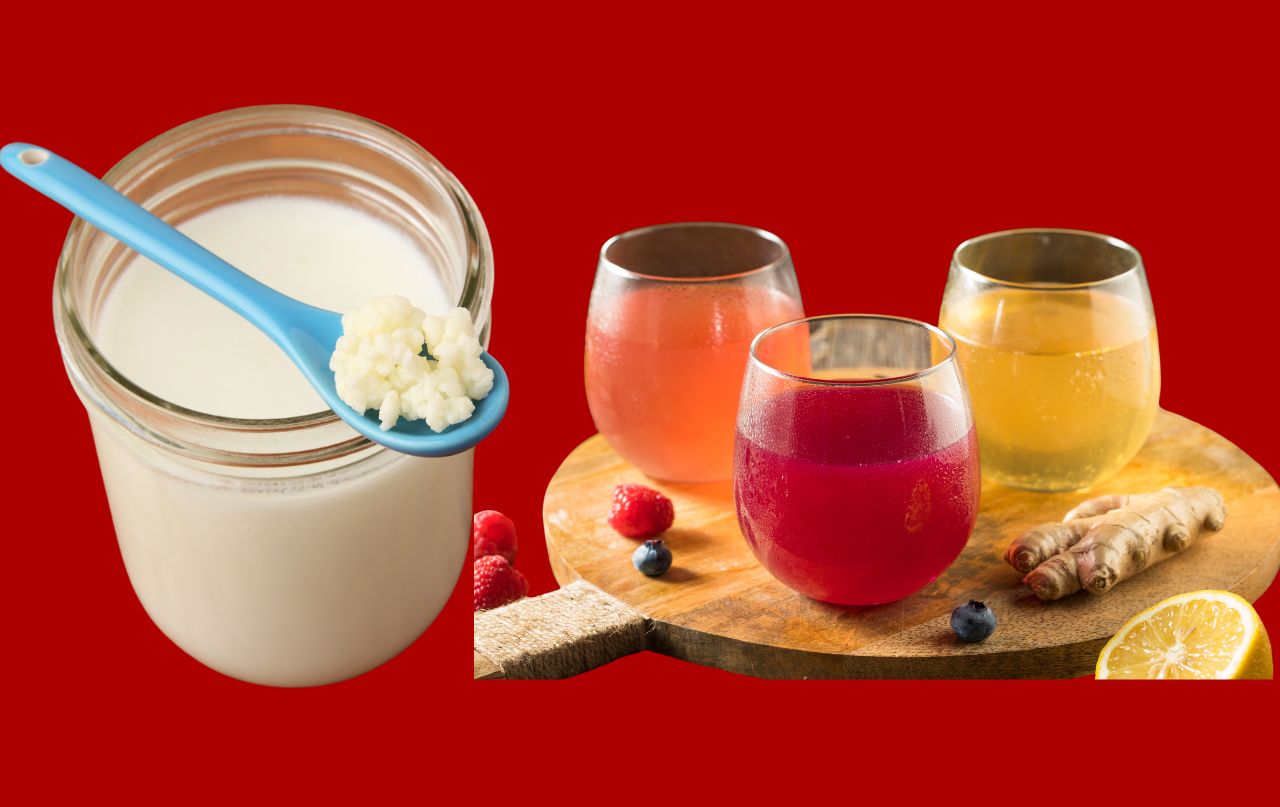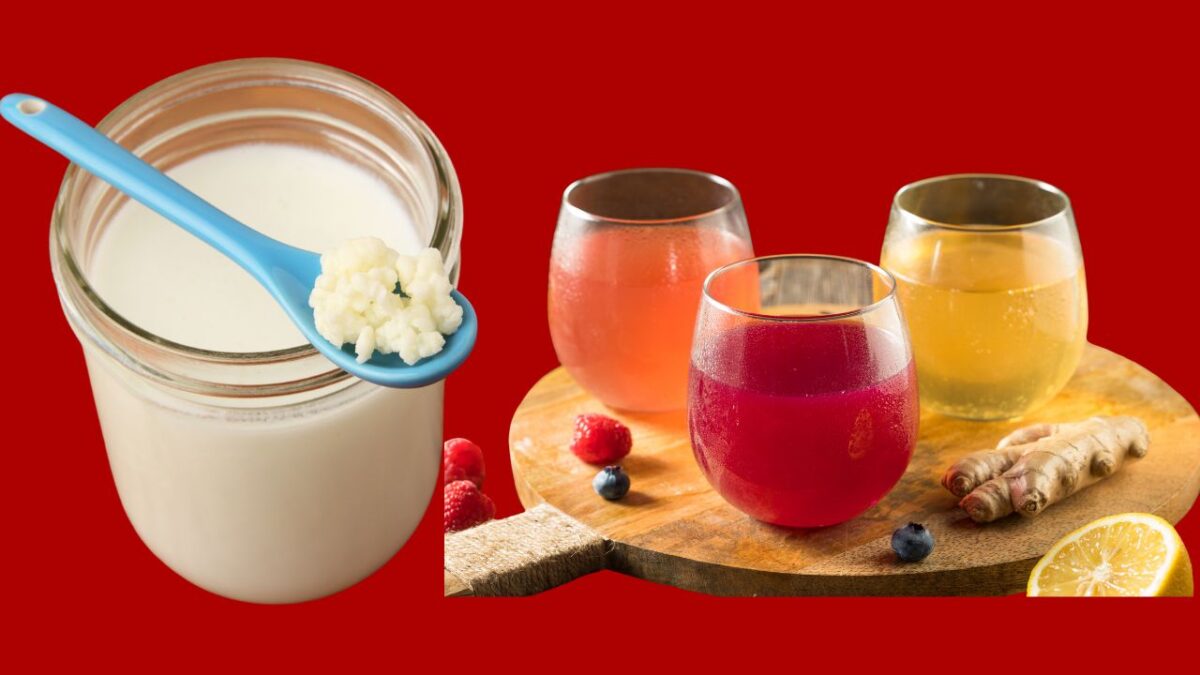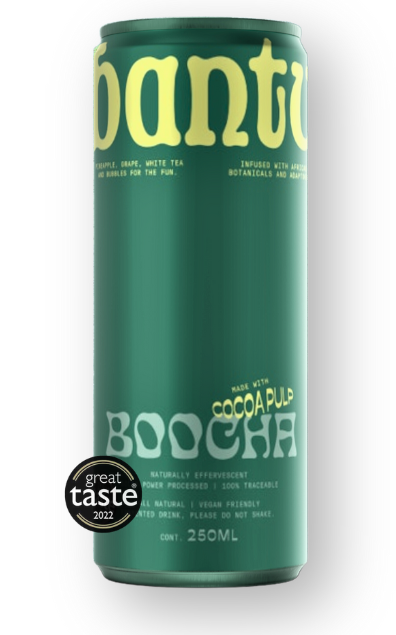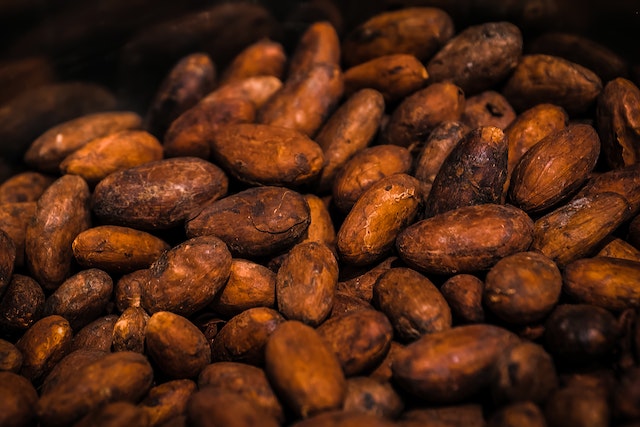
Synergizing Adaptogens and Fermented Drinks for Healthier Living
February 21, 2024
What REALLY is Ethical Chocolate? Beyond Certifications
February 21, 2024Kefir vs. Kombucha
Nutrition and Health Benefits

Kefir and kombucha have similar species of microorganisms and similar health benefits. But they do have differences too.
Kefir and kombucha are among several functional beverages that have gained immense popularity in recent years because of their potential health benefits.
As probiotics-rich drinks, these centuries-old beverages share several similarities. They also have differences in tastes, microbiota, nutritional profiles, and modes of actions of their health benefits. It is no wonder then that many consumers of fermented products enjoy having both drinks in their pantry.
This article looks at the differences between milk kefir and kombucha, and the differences between water kefir and kombucha.
This should help you decide which one is healthier for your lifestyle choices.
Table of Contents
- Summary
- Differences in Microbiota
- Differences in Taste
- Differences in nutrition and calories
- Kefir vs Kombucha: Health Benefits
- Milk Kefir vs. kombucha: which is healthier for you
- Water kefir vs. kombucha: which is healthier for you
- Can you drink kombucha and kefir at the same time
- How to buy the best kefir for you
- How to buy the best kombucha for you
Kombucha vs Kefir: Summary
| Kombucha | Dairy milk kefir | Water kefir | |
| Ingredients | First fermentation:
Green or black tea, SCOBY, sugar to feed the SCOBY during fermentation, starter kombucha liquid.
Second fermentation (optional): Kombucha from first fermentation plus preferred flavour source (commonly ginger, pineapple, mango, strawberry, etc.)
|
First fermentation:
Milk kefir grains plus whole or semi-skimmed pasteurised milk from cow, goat, sheep, camel, or buffalo.
Second fermentation (optional): Kefir from first fermentation plus favourite flavour from fruit or herbs. |
First fermentation:
Water kefir grains, plain, sugared water or alternatives like coconut water, fruit juice.
Second fermentation (optional): Kefir from first fermentation plus favourite flavour from fruit or herbs. |
| Taste | Tangy, sour with an aftertaste similar to apple cider vinegar | Tangy, sour, creamy, and yeasty. | Yeasty and slightly tangy. Tangier with prolonged fermentation. |
| Microbiota
(though these products have the same group of species of bacteria and yeasts, species differ between products) |
Lactic acid bacteria, acetic acid bacteria and yeasts
|
Lactic acid bacteria, acetic acid bacteria, and yeasts. | Lactic acid bacteria and yeasts (more yeasts than in milk kefir grains) |
| Calories/Nutrition Facts
(varies from brand to brand, and from brew to brew) |
~ 12 calories/100ml
Contains carbohydrates (~3%), vitamin C, B vitamins (B1, B2, B6, B12), zinc, copper, iron, manganese, cobalt, amino acids, gluconic acid, polyphenols, and caffeine. |
~67 calories/100ml
Contains carbohydrates (6%), fat (3.5%), proteins (3%). Vitamins A, C, K, B1 (thiamine), B2 (riboflavin) B12 (cobalamin), folic acid, lactic acid, calcium, magnesium, potassium, sodium, iron, zinc, copper, and amino acids. |
~7 calories/100ml (plain, sugared water kefir).
Contains B-vitamins, amino acids (esp. arginine), organic acids
|
| Health benefits | Beneficial for gut health because of probiotics. Also beneficial for other systems because of antioxidant properties. | Beneficial for gut health because of probiotics. Also beneficial for other systems because of antioxidant properties. | Beneficial for gut health because of probiotics. Also beneficial for other systems because of antioxidant properties. |
| Not suitable for | People with caffeine-sensitivity, pregnant women, breastfeeding mothers | Vegans, people with lactose intolerance and allergies to dairy products | Pregnant women |
Kombucha vs. Milk Kefir: Microbiota
Kefir and kombucha contain live beneficial microorganisms which are partly responsible for their potential health benefits.
The number and type of microorganisms in kefir and kombucha vary widely from producer to producer, and even from batch to batch.
For kefir, the type of milk, source of kefir grains, fermentation, and storage conditions all contribute their quota to the final microbiome you may get.
Depending on the source of analysis, kefir may have anywhere from 49 to 80 something different live microorganisms.
Those many microorganisms fall under two or three groups of species, as shown in the table below.
The microbiota of kombucha, like kefir, also depends on the ingredients used and the production process.
| Common micro-organisms | |
| Kombucha | Lactic acid bacteria, acetic acid bacteria, and yeasts. |
| Milk Kefir | Lactic acid bacteria (with Lactobacillus kefiri being the most abundant), acetic acid bacteria, and yeasts. |
Info sources: here, here
Kombucha vs. Water Kefir: Microbiota
Water kefir is a fermented drink made from sugared water (or fruit juice) inoculated with water kefir grains. As such, its microbiota differs from that of milk kefir, especially in terms of the different species of lactic acid bacteria that affect the product characteristics. Notably, water kefir grains contain more yeast species than milk kefir grains.
Kombucha and water kefir have identical microbiota in terms of species of micro-organisms.
| Microorganisms present | |
| Kombucha | Lactic acid bacteria, acetic acid bacteria, and yeasts. |
| Water kefir | Lactic acid bacteria and yeasts (more yeasts than in milk kefir grains) |
Kombucha vs milk Kefir: Taste
Optimally fermented milk kefir tastes tangy, sour, creamy, and yeasty. Carbonation during second fermentation adds a fizz to the drink.
Kombucha also tastes tangy and sour, with an aftertaste similar to apple cider vinegar. Second fermentation makes the drink really fizzy.
It is important to note that the flavours of kefir or kombucha can be influenced by length of fermentation, alternative substrates, and additives, especially during second fermentation.
Kombucha vs. water Kefir: Taste
If fermented only with sugared water, water kefir usually tastes yeasty and slightly tangy, tangier with prolonged fermentation. You may get zesty or apple cider-like flavours, depending on what fruit or herb juices go into the second fermentation jar.
Note that several factors influence the taste of water kefir: amount of sugar used, state and amount of the kefir grains, length of fermentation, and flavours added during second fermentation.
Like water kefir, kombucha’s taste can vary depending on different factors.
Kombucha vs. Milk Kefir: Nutrition and Calories
The nutritional and caloric composition of kombucha and milk kefir depend on the type of ingredients used.
For milk kefir specifically, the nutrient composition depends on the type of animal whose milk is used, including breed and rearing conditions.
| Macro nutrients (approx.) | Minerals/vitamins | |
| Kombucha | Carbohydrates (~3%), | Vitamin C, B vitamins (B1, B2, B6, B12), zinc, copper, iron, manganese, cobalt, amino acids, gluconic acid, polyphenols, and caffeine. |
| Milk Kefir (cow milk) | Carbohydrates (6%), fat (3.5%), proteins (3%). | Vitamins A, C, K, B1 (thiamine), B2 (riboflavin) B12 (cobalamin), folic acid, lactic acid, calcium, magnesium, potassium, sodium, iron, zinc, copper, and amino acids. |
Info sources: here, here, here,
Kefir and kombucha are low caloric drinks, with the number of calories varying from producer to producer. But generally, milk kefir has more calories than kombucha. According to the USDA, a 100 ml serving of organic or raw kombucha contains 12 calories, while the same serving amount of kefir has 67 calories.
Kombucha vs. Water Kefir: Nutrition and Calories
Because water kefir lacks the dairy ingredients of milk kefir, the nutrient and mineral profile definitely changes. Product variations will depend on the type of sugar, fermentation conditions, and what other ingredients go into each stage of the fermentation process.
| Macro nutrients (approx.) | Minerals/vitamins | |
| Kombucha | Carbohydrates (~3%), | Vitamin C, B vitamins (B1, B2, B6, B12), zinc, copper, iron, manganese, cobalt, amino acids, gluconic acid, polyphenols, and caffeine. |
| Water Kefir (inoculated sugared water) | B-vitamins, amino acids (esp. arginine), organic acids |
Sources: here
Kombucha vs. Kefir: Health Benefits
According to a May 2023 review and comparison , kombucha and kefir have common health benefits, although effected through different mechanisms.
Consumers may want to rotate between the products to reap all the benefits through the different modes of action. However, product ingredients determine its suitability for individual consumer preferences and lifestyles.
Health Benefits of Milk Kefir
- Improves gut health
- Antioxidant properties
- May improve diabetes
- Anti-inflammatory effects
- May protect the blood and liver
- May improve the immune system
- May improve high blood pressure and cholesterol levels
- Antimicrobial effects through the abundance of beneficial microorganisms
Health Benefits of Kombucha
The health benefits of kombucha are thanks to the synergistic actions of its acetic acid bacteria, yeasts, glucuronic acid, and polyphenols (source).
Because of similar microbial composition, Kombucha has the same potential benefits as kefir, effected through different mechanisms.
- Improves gut health
- Antioxidant properties
- May improve diabetes
- Anti-inflammatory effects
- May protect the blood and liver
- May improve the immune system
- May improve high blood pressure and cholesterol levels
- Antimicrobial effects through the abundance of beneficial microorganisms
Milk Kefir vs. Kombucha: Which is Healthier for You?
Milk kefir and kombucha are both safe-to-drink functional beverages in people for whom they’re not contraindicated. Most people can safely consume either one or the other. Many consumers actually drink both every day to diversify their gut microbiome.
However, if you have specific goals, the nutritional and caloric content of each product should make the choice for you. As content varies from brand to brand, you’ll have to check labels when making a purchase decision.
As a rule, consume these drinks in moderation, because even though they’re low in calories, the amounts can quickly add up with too much consumption.
Boocha
Our award-winning kombucha, Boocha, made not only from tea, but with cacao pulp juice and sea salt. A truly refreshing drink delivered as a pack of 6 cans.
Water Kefir vs. Kombucha: Which is Healthier for You?
Since the products both offer the same gut benefits, choosing between water kefir and kombucha boils down to individual consumer preferences and product ingredients. However, if you’re sensitive to caffeine, kefir will be the healthier option.
Can you drink kombucha and kefir at the same time (every day)?
Kefir and kombucha have different probiotic profiles, which some consumers exploit to have a diversity in their gut microbiome. Although the fermented beverages have common health benefits, the mechanisms by which they do so differ. Many people safely drink both.
Ensure to avoid drinking large amounts of either one or the other. It is safer to start with smaller amounts and work up as your gut adapts to the different microbiota. Then listen to your body and adjust accordingly.
If your body accepts both drinks every day, does it matter when and which you drink first? Maybe. Knowing that kombucha contains caffeine, you may want to drink it earlier in the day, then drink kefir later in the day. It’s a matter of personal choice. I drink first-brew kombucha even at night and it doesn’t affect my sleep. But second fermentation kombucha makes me sleepy no matter when I drink it. Listen to your body.
How to Buy the Best Kefir for You
Consider the type of animal milk used as this affects the microbiota, taste, nutritional profile, and physical appearance of the kefir.
It is worth noting that milk kefir has more protein than water kefir. Meanwhile, milk kefir from a mixture of different animal milks is believed to have a better nutritional profile than kefir from just one type of milk.
Also look for “enriched kefirs”. This enrichment could be in the number of live microorganisms or nutrients. These are products with non-standardized processes, so content varies from brand to brand.
As a general rule, choose a kefir that suits your personal preferences and dietary needs.
How to Buy the Best Kombucha for You
As content varies from brand to brand, look at the ingredients and their quantities first. Good kombucha is one with a complete fermentation which usually translates to a sharp tangy taste and very low sugar content.
Get a pack of 6 cans of Boocha Kombucha
References
https://www.sciencedirect.com/science/article/pii/S2772753X22000144
https://www.sciencedirect.com/science/article/abs/pii/S0924224421003010
https://www.no1living.com/blogs/blog/everything-you-need-to-know-about-water-kefir
https://www.bbcgoodfood.com/howto/guide/how-make-kefir
https://myfermentedfoods.com/make-dairy-free-kefir/
https://poppyswildkitchen.com/fizzy-second-fermentation-kombucha/
https://www.sciencedirect.com/science/article/abs/pii/S2212429221004570
https://www.medicalnewstoday.com/articles/318353#risks-and-considerations
Dark Chocolate
How much do you know about dark chocolate? Learn to distinguish it from other traditional chocolate types
Cocoa Shortage and Rising Prices in 2024: What Consumers Should Know
Higher cocoa prices are not necessarily due to poor cacao yields. Find out in this article the true cause of current price spikes
The Big Deal About Palm Oil in Chocolate
What with the fuss about palm oil in chocolate? Spoiler alert: it’s not about health concerns.






